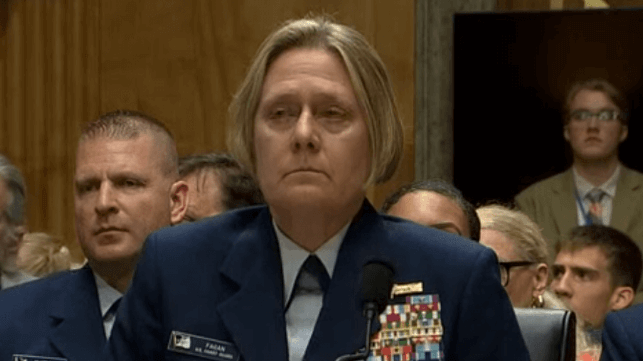One Year On, Senate Pushes Coast Guard for Answers on Sexual Assault

The U.S. Coast Guard's past and current leaders face new scrutiny this week over deepening allegations of attempted concealment of past abuse, including assertions that the service is slow-walking its document production for congressional oversight committees. As in previous hearings over the course of the past year, Commandant Adm. Linda Fagan faced tough questioning over the steps the service is taking to investigate past wrongdoing and change its culture going forward.
The committee is primarily focused on the Coast Guard's internal decision to withhold the Operation Fouled Anchor investigation from Congress in 2018, and on high-level accountability actions for that decision. In pointed questioning by Sen. Richard Blumenthal, Adm. Fagan said that she currently has no evidence of official misconduct in connection with the decision, and is awaiting the outcome of an inspector general investigation before pursuing any actions, like post-retirement reductions in rank.
Blumenthal asked Fagan whether she knew who withheld Operation Fouled Anchor from Congress, and pointed to a copy of the meeting minutes from the internal session when that decision was made. (The identities of the Coast Guard leaders in that meeting are known to the committee.) When Fagan answered that she was waiting for the outcome of an investigation, Blumenthal suggested that some observers might conclude that she "does not want to know" who made the decision, and recommended that she should find out, as the service's current leader.
In her defense, Adm. Fagan noted that the Coast Guard has hired a service-wide victim advocate, implemented a "safe-to-report" policy, and increased support staffing at the Coast Guard Academy. She pledged to support its investigation, and she asked the committee for more financial resources for the Coast Guard Investigative Service (CGIS).
Close scrutiny of good-will visits
Blumenthal also asked Adm. Fagan about a scathing new report from the U.S. Coast Guard Academy's head of sexual assault prevention, Shannon Norenberg, who is quitting her post in protest of the service's past actions. Norenberg, the academy's top victim advocate, alleges that after Operation Fouled Anchor, Coast Guard leaders asked her to travel around the country to meet with victims named in the report and to issue each of them an official statement of regret. Norenberg's records show that she was told - incorrectly - that Congress was aware of Operation Fouled Anchor.
In addition, Norenberg claims, the counseling team was advised not to provide victims with form CG-6095, which performs two functions. The form triggers a mandatory defense database entry for a sexual assault case, and it gives victims the paperwork they need to access veterans' benefits. Norenburg alleges that the form may have been withheld to avoid a sudden spike in sexual assault reports, which could attract unwanted attention from Congress - attention that the Coast Guard's leaders were deliberately trying to avoid at the time.
"The Coast Guard lied to me," Norenberg said in a statement released in advance of the hearing. "I can no longer in good conscience be part of an organization that would betray me, betray victims of sexual assault, and betray the system I helped set up to hold perpetrators at the academy accountable."
Adm. Fagan said that she had not read Norenberg's account, but promised to meet with her, so long as the rules of an ongoing investigation would allow it. She also committed to ensuring that past victims get help accessing their veterans' benefits if any of them missed out on the opportunity.
Questioning on transparency
Over the course of the hearing, Fagan came in for scrutiny from multiple senators over the pace of document production for the committee's investigation. Only about 8,000 out of 1.8 million potentially relevant pages have been provided to Congress to date, nearly a year after the House Committee on Oversight began asking for evidence.
As a solution, Adm. Fagan offered to let the committee see any and all documents related to the case in an in camera (private) setting, which Blumenthal called "completely unacceptable." In camera document review does not provide committee staff with their own digital, searchable copies of the evidence, making in-depth investigative work far more difficult, he said.

that matters most
Get the latest maritime news delivered to your inbox daily.
"What is needed from the Coast Guard today is an unsparing commitment to truthtelling . . . even if it is embarrassing to former members of the Coast Guard, or current members," said Sen. Blumenthal. "That is what serves the interests of the nation."
After the hearing, some victims' advocates panned the outcome and called for more action. “We are speaking to Coast Guard Academy sexual assault survivors on a near daily basis. At today’s hearing, they were expecting answers and for the Coast Guard to take accountability,” said Christine Dunn, partner at Sanford Heisler Sharp. “Instead, the Commandant gave platitudes with no real substance or plan to give justice to survivors.”
